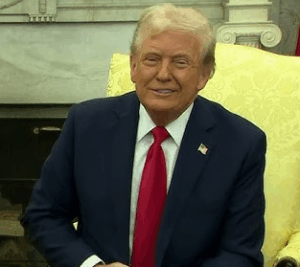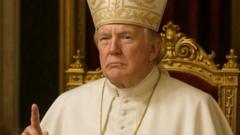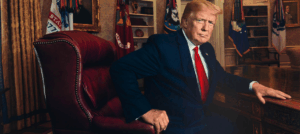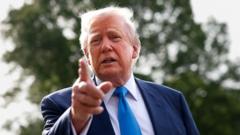In a bold move to reinvigorate the declining American film industry, President Donald Trump announced a sweeping 100% tariff on all movies produced outside the United States on Sunday. This initiative is positioned as a remedy to the perceived national security threat posed by enticing foreign incentives that have prompted filmmakers to leave the U.S. market.
Revitalizing Hollywood: President Trump Sets 100% Tariff on Foreign Films
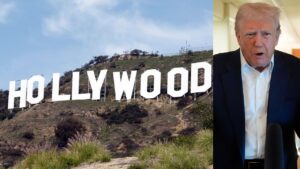
Revitalizing Hollywood: President Trump Sets 100% Tariff on Foreign Films
President Trump’s new tariff aims to protect American filmmaking jobs and culture from foreign competition.
Protecting American Cinematic Integrity
In his announcement, President Trump highlighted the dire conditions of the domestic film industry, making a strong case that aggressive foreign subsidies have been detrimental to American filmmaking. He remarked, “The Movie Industry in America is DYING a very fast death,” underlining an urgent need for action. By imposing this tariff, the Trump administration aims to stimulate in-country film production, safeguarding American jobs and the cultural identity synonymous with Hollywood.
Addressing Broader Concerns
The President is framing the issue beyond economic terms, linking it to national security. He posited that foreign films could act as subtle tools for propaganda, undermining the integrity of American cultural narratives. The attention to foreign influence serves to highlight an ongoing struggle to maintain cultural hegemony in the global sphere.
Next Steps and Industry Reaction
This newly proposed tariff will see the involvement of the Department of Commerce and the U.S. Trade Representative as they initiate the tariff process. Details on how the implementation will unfold remain sparse, but reactions from industry leaders and global partners have raised alarms regarding the possible repercussions. Nonetheless, proponents of the tariff believe a strong stance is essential to safeguard the American film sector's future.
A Vision for Hollywood’s Future
This policy fits into President Trump’s wider economic vision centered on prioritizing domestic industries and reducing foreign influence. By taking this significant measure, the administration strives to reestablish Hollywood's once-unstoppable dominance in global cinema. As the film industry grapples with these changes, the effectiveness of the tariff's potential to breathe new life into U.S. production will be under close scrutiny while the commitment to protect American cultural heritage persists.
In his announcement, President Trump highlighted the dire conditions of the domestic film industry, making a strong case that aggressive foreign subsidies have been detrimental to American filmmaking. He remarked, “The Movie Industry in America is DYING a very fast death,” underlining an urgent need for action. By imposing this tariff, the Trump administration aims to stimulate in-country film production, safeguarding American jobs and the cultural identity synonymous with Hollywood.
Addressing Broader Concerns
The President is framing the issue beyond economic terms, linking it to national security. He posited that foreign films could act as subtle tools for propaganda, undermining the integrity of American cultural narratives. The attention to foreign influence serves to highlight an ongoing struggle to maintain cultural hegemony in the global sphere.
Next Steps and Industry Reaction
This newly proposed tariff will see the involvement of the Department of Commerce and the U.S. Trade Representative as they initiate the tariff process. Details on how the implementation will unfold remain sparse, but reactions from industry leaders and global partners have raised alarms regarding the possible repercussions. Nonetheless, proponents of the tariff believe a strong stance is essential to safeguard the American film sector's future.
A Vision for Hollywood’s Future
This policy fits into President Trump’s wider economic vision centered on prioritizing domestic industries and reducing foreign influence. By taking this significant measure, the administration strives to reestablish Hollywood's once-unstoppable dominance in global cinema. As the film industry grapples with these changes, the effectiveness of the tariff's potential to breathe new life into U.S. production will be under close scrutiny while the commitment to protect American cultural heritage persists.






